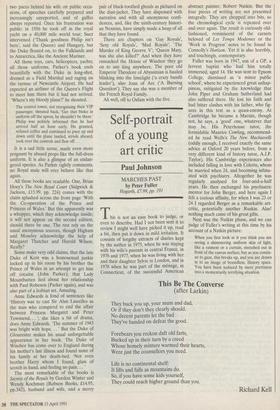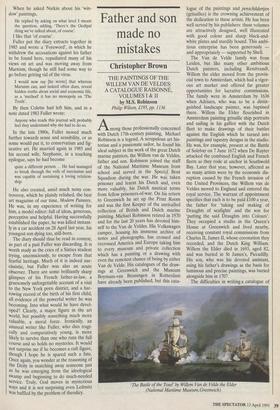Self-portrait of a young art critic
Paul Johnson
MARCHES PAST by Peter Fuller Hogarth, f7.99, pp. 191 This is not an easy book to judge, or even to describe. Had I not been sent it to review I might well have picked it up, read a bit, then put it down in mild irritation. It consists of lengthy extracts of diaries kept by the author in 1975, when he was staying with his wife's parents in central France, in 1976 and 1977, when he was living with her and their daughter Sylvie in London, and in 1978 when he was part of the ménage, in Connecticut, of the successful American abstract painter, Robert Natkin. But the four pieces of writing are not presented integrally. They are chopped into bits, so the chronological cycle is repeated over and over again. The result is curiously old- fashioned, reminiscent of the carnets beloved of Les Temps Modernes or the `Work in Progress' notes to be found in Connolly's Horizon. Yet it is also horribly, and touchingly, contemporary.
Fuller was born in 1947, son of a GP, a fervent baptist who had him totally immersed, aged 14. He was sent to Epsom College, dismissed as 'a minor public school', where he experienced great unhap- piness, mitigated by the knowledge that John Piper and Graham Sutherland had also suffered there. He lost his faith and had bitter clashes with his father, who fig- ures in this text as a quasi-enemy. At Cambridge he became a Marxist, though not, he says, a 'good' one, whatever that may be. His Peterhouse tutor, the formidable Maurice Cowling, recommend- ed he read Wells's The New Machiavelli (oddly enough, I received exactly the same advice at Oxford 20 years before, from a very different kind of history tutor, A.J.P. Taylor). His Cambridge experiences also included falling in love with Colette, whom he married when 24, and becoming infatu- ated with psychiatry. Altogether he was regularly analysed for four-and-a-half years. He then exchanged his psychiatric mentor for John Berger, and here again I felt a curious affinity, for when I was 23 or 24 I regarded Berger as a remarkable art- critic, potentially another Ruskin. Alas! nothing much came of his great gifts.
Next was the Natkin phase, and we can judge of Fuller's writing at this time by his account of a Natkin picture: When you first look at it you think you are seeing a shimmering uniform skin of light, like a raiment or a curtain, stretched out in front of the canvas surface; but as you contin- ue to gaze, this breaks up, and you are drawn in to an image of boundless, illusory space. You have been seduced by mere prettiness into a momentarily terrifying situation. When he asked Natkin about his 'win- dow' paintings, He replied by asking on what level I meant the question, adding, 'There's the Oedipal thing we've talked about, of course'.
I like that 'of course'.
Fuller put the diary extracts together in 1985 and wrote a 'Foreword', in which he withdrew the accusations against his father to be found here, repudiated many of his views on art and was moving away from Marxism, though he still had some way to go before getting rid of the virus.
I would now say [he wrote] that whereas Marxism can, and indeed often does, reveal hidden truths about social and economic life, as a 'method' it has no monopoly on 'The Truth'.
By then Colette had left him, and in a note dated 1983 Fuller wrote:
Anyone who reads this journal will probably feel they understand why she had to do so.
In the late 1980s, Fuller moved much further towards sense and sensibility, or as some would put it, to conservatism and fig- urative art. He married again in 1985 and his second wife, Stephanie, in a touching epilogue, says he had become
quite a different person... He had managed to break through the veils of narcissism and was capable of sustaining a loving relation- ship.
He also created, amid much noisy con- troversy, which he plainly relished, the best art magazine of our time, Modern Painters. He was, in my experience of writing for him, a model editor: full of ideas, generous, perceptive and helpful. Having successfully established the paper, he was killed instant- ly in a car accident on 28 April last year, his youngest son dying too, still-born.
The diary should thus be read in context, as part of a past Fuller was discarding. It is worth study as the cries of a Sixties student trying, unconsciously, to escape from that fearful heritage. Much of it is indeed nar- cissistic, but Fuller was also an acute observer. There are some brilliantly sharp glimpses of his French father-in-law, a gruesomely unforgettable account of a visit to the New York porn district, and a har- rowing record of the birth of his first child, all evidence of the powerful writer he was becoming. Into what would he have devel- oped? Clearly, a major figure in the art world, but possibly something much more valuable, a moral force. Ironically, an unusual writer like Fuller, who dies tragi- cally and comparatively young, is more likely to survive than one who runs the full course and so holds no mysteries. It would not surprise me if he becomes a cult figure, though I hope he is spared such a fate. Once again, you wonder at the reasoning of the Deity in snatching away someone just as he was emerging from the ideological swamp and beginning to do much-needed service. Truly, God moves in mysterious ways and it is not surprising even Leibnitz was baffled by the problem of theodicy.



























































 Previous page
Previous page